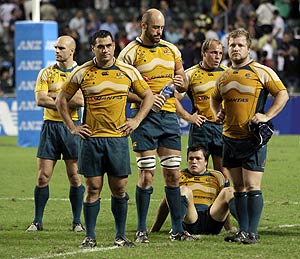
Memo to the Wallabies after their gut-wrenching defeat at Hong Kong against the All Blacks 19 – 14: remember that rugby is an 80 minute game. As Sean Fitzpatrick might have said, the historic Hong Kong Bledisloe Cup Test was a game of two halves, with the Wallabies on top and in front in the first half, and the All Blacks on top and in front at full-time, 19 -14.
After being so dominant in the first half, when they should have scored more points than they did, the Wallabies virtually collapsed as soon as they ran on to the slippery field in the second half and were outscored 10 – 0, with the All Blacks bombing several other scoring chances.
At the end of the Test, which was an enthralling encounter, with the ball like a slippery piece of soap and a greasy field making purposeful running difficult, I wrote in my notebook that three factors had undone the Wallabies.
1. A falling of the fitness levels, both physical and mental, the longer the Test went on.
Matt Giteau should never have missed that penalty about 35m out and almost in line with less than 20 minutes to go to bring the score line back to 19 – 17. At the end of the Test, too, the Wallabies were inside the All Blacks 22 several times, and stupid decisions were made, passes were fumbled, and so on.
2. Gamesmanship with the scrums and rucks and mauls was continued for too long.
It was clear from the beginning of the Test that referee Alan Lewis didn’t want much of a contest at the rucks. He penalised Richie McCaw at the first breakdown. From then on, he penalised the Wallabies, and rightly so. They continued to dive in, even when Lewis made it clear that he wasn’t going to allow this. The three penalties Dan Carter kicked for the All Blacks in the first half kept them in a game they were being shut out of.
The same comment applies to the scrums.
It was clear that the Wallabies were touching when asked to ‘touch’, but were engaging before the call. Then Luke Burgess was feeding quickly before the referee had worked out the con. When the referee did work it out, the Wallabies continued to offend, and were penalised. And when the scrums were set properly, the All Blacks, on the Wallaby feed, were able to monster the Wallaby pack. Were the second-rowers pushing properly? Have Al Baxter and Matt Dunning finally reached their used-by date?
As an aside, except in the scrums and rucks, the Wallabies showed a lot of enterprise on attack and defence. Although, as Rod Kafer pointed out, they should have run back more kicks and spread the ball more from turnovers. But they are going to struggle even against teams like Italy if they get bogged down in a forward-attrition match. If they can clear the ball, there is an enterprise and skill level, as they showed with their two tries in the first half, that any team in the world, and particularly Northern Hemisphere teams, are going to find difficult to contain.
One further aside.
I watched the Foxtel commentary. Channel 7 has been a poor sponsor of rugby and I’m not going to support them in any way. This means, however, that I have to listen to the rantings of Greg Martin and Phil Kearns, both Wallabies, with Kearns being one of the all-time greats.
But not all-time greats, or remotely near it, as analysts. Time and time again, they would berate the referee for a poor decision and when the replay showed that he was right (and I am no fan of Alan Lewis, either), there was silence on their part.
I’ve had this out with Martin, an amiable fellow.
He says that everyone knows he’s biased towards Queensland and the Wallabies. But my response is that he (and Kearns) let their bias get in the way of a proper reading of what is happening in the match. Wallaby supporters listening to the Martin-Kearns show find it difficult to work out how the Wallabies lose any Tests.
And a final aside, Robbie Deans made the valid point that the plethora of scrum penalties, particularly, were a good advertisement for the full ELVs in that the referee should not be deciding the outcome of Tests.
3. Graham Henry used his bench well by bringing on Piri Weepu, who had played a lot of rugby in the last couple of months, to replace Jimmy Cowan, who was match-rusty very early in the second half.
Ma Nonu, also a player who has played some rugby recently, was brought on at the same time. These two players, Nonu particularly, provided a lot of energy to the All Blacks, which lifted the play of the rest of the side.
The team also benefited from Carter running things at first five-eighths.
Can anyone explain why Henry seems to be determined never to play his best starting 15?
The statistics of the Test told the tale: possession New Zealand 55 – Australia 45. Time in opposition 22 New Zealand 5.46 minutes – Australia 3.26. Missed tackles New Zealand 12 – Australia 26.
Good points for the Wallabies were the first 40 minutes, when they looked like a champion side, a side capable of defeating any side in the world; the energy Luke Burgess brought to the halfback position; the attacking defence, especially in the first half; the outstanding ensemble play that led to the first try; a couple of strong scrums; some good lineout work; and the sharp play of Matt Giteau.
What supporters want now is for all this good work to be played out for the entire game.
Rugby, after all, is an 80 minute game, and being ahead at half-time as the Wallabies have been in the last two Tests against the All Blacks, does not secure a victory.
So now on to Europe.





























































































